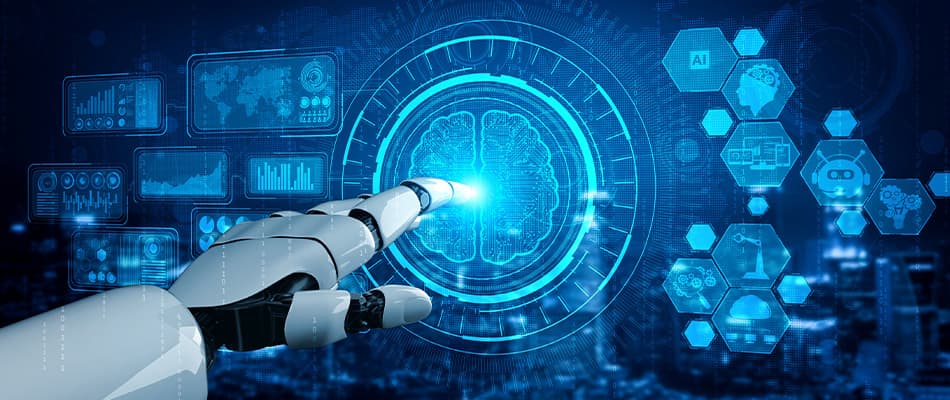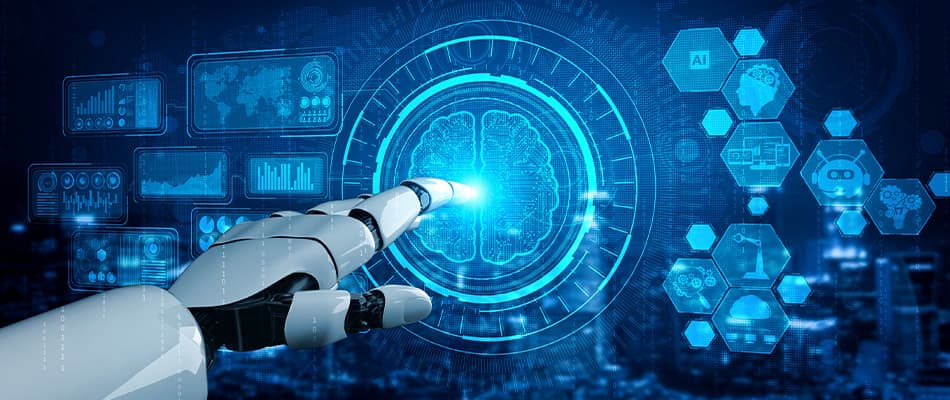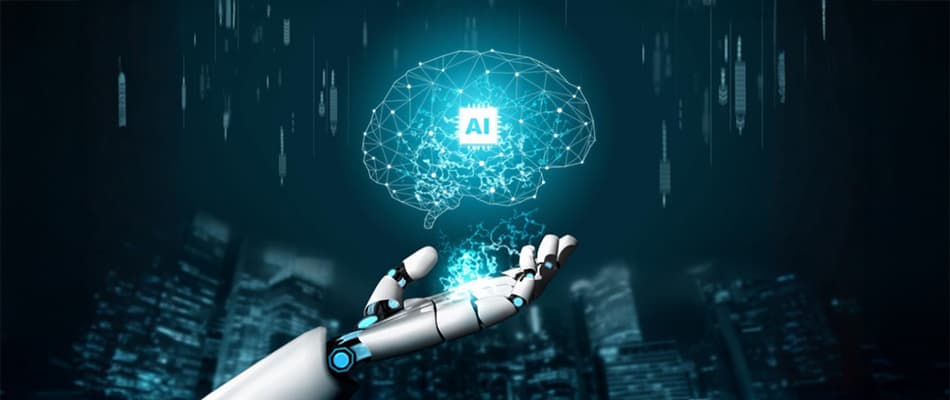Learn How is AI Changing Digital Marketing: Exploring Benefits and Challenges
Digital marketing is evolving at an extraordinary pace, and artificial intelligence (AI) plays a major role in this transformation. AI is revolutionising how businesses connect with their audiences, making marketing strategies smarter and more efficient. Nowadays, one question that often arises is: How is AI changing digital marketing? By analysing large amounts of data, AI helps marketers understand customer behaviour, predict trends, and create personalised experiences that resonate with users. Moreover, it helps by automating repetitive tasks, improving how we target audiences, and making content creation easier. It allows chatbots for instant support and uses predictive tools to understand what customers might need next, changing how marketing is done.
In this article, we will explore the benefits AI brings to digital marketing, such as enhanced efficiency and improved ROI. We will also discuss the challenges businesses face when adopting these technologies.
What is AI in Digital Marketing?
Artificial Intelligence (AI) in digital marketing refers to the use of intelligent technologies to analyse data, predict user behaviour, and make decisions that enhance marketing strategies. It allows marketers to automate processes, personalise customer experiences, and gain valuable insights from large datasets. Understanding how AI is changing digital marketing begins with exploring its applications and benefits.
AI transforms digital marketing by analysing customer data to create personalised campaigns and predict trends. It enables businesses to make smarter decisions and optimise their strategies in current situations. Additionally, AI tools can recommend products based on browsing history or automate email marketing for better engagement.
Why Does AI Matters?
Artificial Intelligence (AI) has become an essential tool in digital marketing because it transforms how businesses interact with their audiences and manage campaigns. Its ability to analyse large volumes of data and identify patterns helps marketers to make informed decisions that were once impossible. Marketers use the following advantages to show how AI is changing digital marketing by improving engagement, saving time, and enhancing accuracy:
- Personalisation: AI examines user behaviour, preferences, and interactions to deliver content, ads, and recommendations tailored to individual needs. For example, e-commerce platforms use AI to suggest products, creating a personalised shopping experience.
- Automation: AI reduces the time spent on routine activities like scheduling social media posts, managing email campaigns, and sorting customer queries. This allows marketers to focus on strategy and creativity while AI handles operational tasks.
- Data Analysis: By processing and analysing data at a scale and speed unmatched by humans, AI suggests hidden trends, customer insights, and actionable strategies. These insights drive targeted campaigns and improve overall decision-making.
Popular AI Applications in Digital Marketing
AI tools and applications have changed how digital marketing is executed, making campaigns more effective and customer-centric. The following applications exemplify how AI is changing digital marketing by streamlining processes, improving targeting accuracy, and creating meaningful customer interactions.
- Chatbots: AI-powered chatbots are available 24/7, providing instant customer support, answering common queries, and guiding users through the process. These bots enhance customer satisfaction while reducing response time and workload for support teams.
- Predictive Analytics: AI anticipates customer behaviour by analysing historical data, helping businesses forecast trends, identify potential leads, and refine marketing strategies.
- Content Creation: Advanced AI models, such as GPT-based tools, can generate compelling blogs, social media captions, and ad copy in seconds. This allows businesses to produce quality content at scale, saving time and resources.
- Recommendation Systems: AI algorithms suggest products or services based on user activity, preferences, and purchase history. Platforms like Amazon and Netflix excel in using this feature to increase customer satisfaction and retention.
Read on to learn What is a digital marketing course
Key Ways AI is Transforming Digital Marketing
AI is transforming digital marketing by improving personalisation, streamlining processes, and enhancing data-based decision-making. It enables businesses to create customised experiences, automate repetitive tasks, target specific audiences, and optimise content for more significant impact. Below are some key areas where we will learn how AI is changing digital marketing to make a prominent difference:
Personalised Customer Experiences
AI helps businesses deliver specific customer experiences based on personal preferences by analysing user preferences, behaviour, and interactions. It enables marketers to personalise content, emails, and advertisements that resonate with individual customers. Some of the key examples include:
- Email Campaigns: AI recommends products based on a customer’s browsing history, enhancing relevancy and driving conversions.
- E-commerce Recommendations: Platforms like Amazon and Netflix use AI to suggest items or shows tailored to user interests, improving the user experience and increasing sales or views.
Automated Marketing Processes
AI automates time-consuming tasks, allowing marketers to focus on creativity and strategy. Key areas include customer support and campaign management. Such automation highlights how AI is changing digital marketing by reducing workloads and improving response times.
- Chatbots: These provide 24/7 customer assistance, instantly answering questions or guiding users through purchases.
- Marketing Automation: AI handles tasks like email scheduling, social media posts, and lead nurturing with precision and efficiency.
Enhanced Audience Targeting
AI analyses user demographics, behaviours, and engagement patterns to identify specific audience segments. This data enables marketers to craft targeted campaigns that maximise ROI. Some key benefits of AI-driven audience targeting include:
- Precise Segmentation: AI helps marketers define highly specific audience segments, ensuring ads reach the right individuals at the right time.
- Improved Campaign Performance: By targeting relevant audiences, campaigns experience better engagement, resulting in higher conversion rates.
- Reduced Resource Wastage: With enhanced targeting, businesses can allocate resources more efficiently, avoiding ad spending on irrelevant audiences.
Content Creation and Optimisation
AI-powered tools generate and optimise content for various platforms, ensuring quality and relevance. This evolution in content strategies shows how AI is changing digital marketing by streamlining creativity and consistency.
- Content Creation: AI models like GPT generate blogs, captions, and ad copy with ease.
- Optimisation: Tools like Grammarly ensure the tone and language align with brand goals.
Predictive Analytics
AI enables businesses to anticipate trends and customer behaviours through predictive analytics. It allows businesses to act proactively. By using historical data and advanced algorithms, companies can stay ahead of market changes and customer needs. Some of the key applications include:
- Forecasting Product Demand: AI predicts product demand based on historical sales data, helping businesses optimise inventory and supply chain management.
- Identifying Potential Leads: AI analyses customer behaviour to identify leads most likely to convert, improving the efficiency of sales and marketing efforts.
Voice and Visual Search Optimisation
AI powers innovative search technologies, reshaping how users interact with brands. These advancements by AI help businesses to make strategies that align with user behaviours.
- Voice Search: Assistants like Alexa and Google Assistant influence search-based marketing.
- Visual Search: AI allows users to search by uploading images, improving product discoverability.
Real-Time Decision Making
AI processes data simultaneously to optimise ad campaigns and bidding strategies. Instant adaptability represents how AI is changing digital marketing by ensuring campaigns remain effective and relevant. Some of the applications are given below:
- Programmatic Advertising: AI adjusts bids for ad spaces instantly to maximise campaign performance.
- Campaign Adjustments: AI uses live performance metrics to make real-time adjustments, ensuring campaigns stay on track.
Know How to Start a Career in Digital Marketing Here!

Benefits of AI in Digital Marketing
AI offers numerous advantages that empower businesses to enhance their digital marketing efforts. From increasing efficiency to improving return on investment (ROI) and scaling operations seamlessly, AI has become a helping hand for creating impactful marketing strategies. Some of the main benefits that we should know while understanding how AI is changing digital marketing are discussed below:
Increased Efficiency
AI improves digital marketing by automating tasks like scheduling posts and managing data. This saves time, letting marketers focus on strategy. Tools like chatbots answer customer queries quickly and reduce workload.
Improved ROI
AI improves ROI by targeting the right audience and personalising ads to their preferences. Tools like predictive analytics help marketers forecast trends and optimise budgets. This shows how AI is changing digital marketing by increasing conversions and helping businesses achieve better results with less waste.
Scalability
AI helps businesses grow their marketing without high costs. Small businesses can automate campaigns, while larger ones manage more customers efficiently. AI tools adjust to growing data, keeping campaigns effective. This scalability makes essential marketing tools accessible to businesses of all sizes.
Challenges of Implementing AI in Digital Marketing
While AI transforms digital marketing, its implementation comes with challenges that businesses must address. High costs, privacy issues, and dependency on data quality are significant hurdles. Being aware of the following obstacles is important to ensure a smoother adoption process for businesses utilising AI:
High Initial Investment
Implementing AI often requires an initial high investment in software, infrastructure, and skilled staff, which can be challenging for small businesses. However, as AI becomes more affordable, tools like chatbots and automation are becoming accessible, highlighting how AI is changing digital marketing for businesses of all sizes.
Data Privacy Concerns
AI uses user data to offer personalised experiences, but this can raise privacy and legal issues with regulations like GDPR and CCPA. Businesses must focus on ethical practices and transparency to build trust and ensure responsible data handling.
Dependency on Quality Data
AI works best with accurate, organised data. Poor-quality data can lead to errors and less effective marketing. Marketers need to invest in cleaning and managing data to get the most out of AI-driven strategies.
Explore the Digital Marketing Course to Become Expert Digital Marketer Here!
Future Trends in AI and Digital Marketing
AI continues to evolve, introducing innovative trends that redefine digital marketing strategies. From AI-powered video marketing to personalisation and emotion recognition, these advancements demonstrate how businesses can deliver more engaging and meaningful customer experiences. In fact, 56% of businesses are using AI to improve and perfect their operations. Additionally, AI has the potential to increase labour productivity growth by 1.5 percentage points annually over the next decade, with global AI-driven growth predicted to be nearly 25% higher than automation without AI. Marketing, software development, and customer service are among the fields leading in AI adoption and investment.
Some of the future trends we may encounter in AI and Digital Marketing are as follows:
AI-Powered Video Marketing
AI is transforming video marketing by helping businesses create personalised videos based on user preferences. AI tools analyse interactions to suggest custom video recommendations or dynamic ads, making content more engaging and relevant. This shows how AI is changing digital marketing by enhancing creativity and targeting in video campaigns.
Hyper-Personalisation
AI creates dynamic, personalised website experiences by analysing browsing behaviour, past purchases, and real-time interactions. E-commerce platforms use AI to recommend products or adjust pages based on user interests, making customer journeys more engaging and tailored.
Emotion Recognition AI
Emotion recognition technology allows AI to detect emotions through facial expressions, voice tones, or text. This helps brands craft campaigns that emotionally connect with their audience by adapting messages to match the customer’s mood or needs.
Why Learn Digital Marketing with AI at Digital Regenesys?
The Digital Marketing Course with Gen AI offered by Digital Regenesys helps you to build expertise in marketing with training in AI technologies. It equips you with in-depth knowledge and practical skills in digital marketing. This course teaches you to use AI to analyse customer behaviour. Enrolling in this course will help you understand how is AI changing digital marketing.
Here is why you must choose this course to gain expertise in Digital Marketing with AI:
- Learn AI-driven tools for marketing automation, predictive analytics, and personalised campaigns.
- Gain practical experience with tools like Suno, Traackr, Dall-E, Google Search Console, and ChatGPT.
- Benefit from mentors who have hands-on expertise in AI-powered marketing strategies.
- Develop the knowledge needed for roles where AI expertise transforms digital marketing success.
- Gain a globally recognised certificate after successfully completing the course.
In conclusion, as we explored how AI is changing digital marketing, we learnt that it provides tools and techniques that help businesses engage with their audiences more effectively. From automation and personalisation to advanced data analysis and predictive insights, AI empowers marketers to deliver impactful campaigns with enhanced efficiency and precision. While challenges like data privacy and high initial investment exist, the benefits outweigh the obstacles, making AI an essential tool in modern marketing.
By learning how to make marketing strategies with AI through courses like the one offered by Digital Regenesys, you can stay ahead in this field and explore new career opportunities.
How is AI Changing Digital Marketing? – FAQs
How is AI changing digital marketing?
AI is transforming digital marketing by automating tasks, improving audience targeting, personalising content, and providing data-driven insights for better campaign effectiveness.
How is AI changing up the digital marketing field?
AI enhances digital marketing by streamlining processes, predicting customer behaviour, automating repetitive tasks, and optimising content creation, leading to higher efficiency and ROI.
What are some popular AI applications in digital marketing?
AI applications in marketing include chatbots, predictive analytics, content creation tools, and recommendation systems, which improve customer engagement and campaign targeting.
What benefits does AI offer in digital marketing?
AI improves efficiency, enhances customer personalisation, boosts ROI, and scales marketing efforts by automating tasks and providing valuable data insights.
What are the challenges of implementing AI in digital marketing?
Challenges include high initial costs, data privacy concerns, and the need for quality data. Addressing these ensures effective AI adoption in marketing strategies.
Recommended Posts










